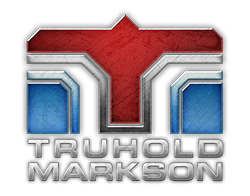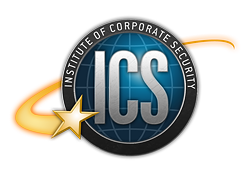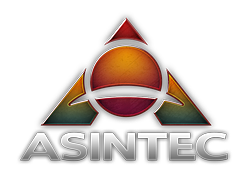The new leaders of Earth
The world order as we know it today reached its current form by the 2170’s. The sham governments of the ‘corporate republics’ are still in place, but control no human achievement anymore. Every great invention is born under the supervision of big corporations and agencies; every creation bearing company logos and brand names instead of national flags. The colonization of space is an industry with enormous need for capital and technological capacity, which can only be satisfied by the three corporate giants, whose operations are wide-ranging even beyond the realm of space research. In order to secure their absolute dominance, they are trying to shut the public and other competitors out of the project. Brought together by a new, common goal, space colonization, they founded a jointly managed supervisory body, the Syndicate.
Truhold-Markson

The fusion in 2178 of the weapons-producing company founded by Eric Truhold and the Markson company, with interests in information technology, telecommunications and agriculture created Truhold-Markson, a corporation owning American and Canadian companies.
The recession of American economy in the 21st century refashioned the world of capital. One of the changes was the privatization of American space research. In its current form, with its enormous budget and lack of success, NASA could not compete with the Far Eastern space research progress. For this reason, the president was forced to give in to the pressure imposed by private capital. The first companies that bought a share in the space program restored the shattered reputation of the US economy.
The privatization of space research eventually brought serious results, as research priorities changed when government control was eliminated. It was not long before a solid ownership structure was shaped and all the smaller companies entering the business too late found themselves victims of cutthroat competition. Owing to its international investments, Truhold Group had no difficulty surviving the collapse of American economy after the war.
The Truhold family increased its influence step by step and became the single player in American space research by 2145. The new world order gives more power to the leaders of the key branches - and the members of the all-powerful Truhold family - than to the president of the United States. At present, the young Jesper Truhold is the president of the corporation.
ICS - Institute of Corporate Security

Following the collapse of the Soviet Union, Russia and the European Union developed economic interdependence. The Russian economy driven by energy exports was paired by the energy-hungry European Union. The introduction of new energy sources brought partial relief to the scarcity of oil but the close economic interdependence still exists between these two blocks of power.
Their cooperation resulted in a jointly operated administrative body, the Institute of Corporate Security. Originally, the ICS was meant to protect the economies of Russia and the EU in the unstable financial situation and for this reason it received wide monetary authority. The EU was actively participating in the colonization of the Solar system from the mid-21st century, but Russia’s extra-terrestrial investments were limited to space tourism after the MIR’s operations were stopped. The Russian president Valentin Pashev saw the strength of the competition and offered to cooperate with the European Union’s space administration, the ESA, and thus offering assistance to the EU for the entire space research program.
The steady rise of living standards could not suppress the fact that the government’s action as a restricting agents could not keep up with the dynamic headway of market economy. The already unstable Russian administration was helpless before the power fights of the oligarchs.
In Western Europe, governments had to fight the proliferating transnational cartels whose influence was strong all over Europe. The ICS fought bravely in the war against corruption and it was the last soldier defeated. After the global war, the Institute took the task of stabilizing the economy and restoring the regional administrative bodies. For this, ICS wanted to use Russia’s and the EU’s “abandoned” military industry. As was the case with other state enterprises, the ICS was taken over by private capital.
Despite its past, the ICS is the most democratic body of the Syndicate. It is managed by a committee of members delegated by the lesser agencies, which members are also part of the decision-making body of the Syndicate.
Asintec

Asian countries developed quite differently from the Western culture until the middle of the 20th century. These countries standing on different levels of development soon began to follow the Western model of market economy, trying to achieve power often at each other’s cost. A collective plan designed to deal with the energy crisis eventually broke the ice and improved the relationship between these states.
The countries of the Far East aimed to get a share of every energy innovation around the globe, in order to have resources that match the development they had undergone since the beginning of the 21st century. The very secretive wave of research and development was initiated by China, and started with the building of experimental power plants, with Japan and India soon joining in, followed by South Korea, Indonesia and Malaysia.
China was the pioneer in worldwide spread of the Asian influence: state-founded companies began to expand in the Western economies. This is how Asian countries eventually got ownership of a number of Australian and American mining complexes, as well as numerous oil and gas fields in Russia.
The Asian economic union was also fuelled by the slowly emerging tycoons of China. These capital-holders, who had been subordinate to the state administration around the millennium, used the weakness of the state and regained independence after the third world war. The power formerly controlled by the single party government got into the hands of state-founded but individually developed companies.
Asintec, short for Asian International Technologies, became one of the most powerful companies in the world long after the third world war. After the acquisition of numerous firms that went bankrupt in the war, the big breakthrough came when Asintec bought up the Asian space research agencies. This opened the opportunity to participate in the colonization of space which Asintec is successfully benefiting from as a member of the Syndicate.
< Prologue | Table of contents | Breaking out from the Solar System >




